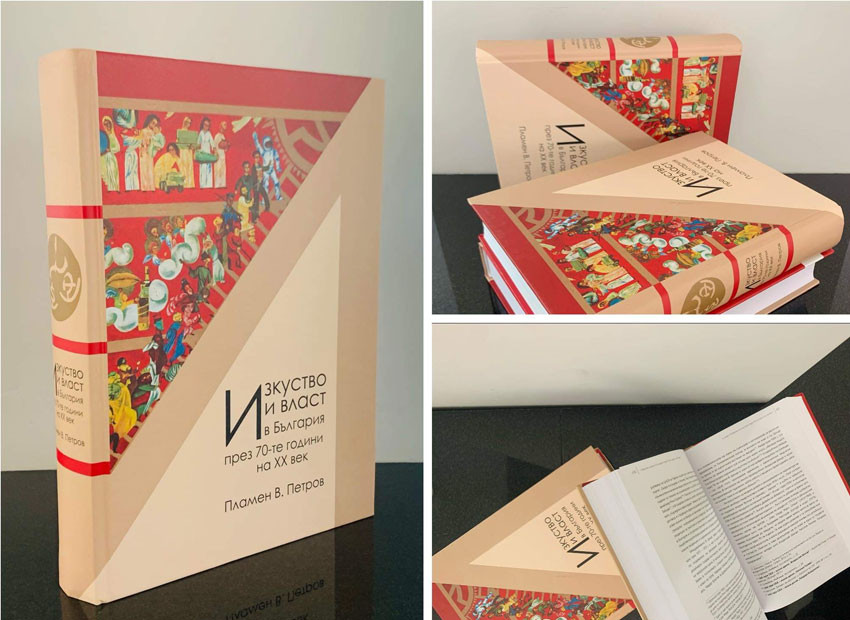"Mankind are so much the same, in all times and places, that history informs us of nothing new or strange in this particular. Its chief use is only to discover the constant and universal principles of human nature." This is a quote by David Hume, which opens the story about the 70s of the twentieth century in Bulgaria told by art critic and historian Dr. Plamen Petrov. Actually, this is a scientific work that is more than 700 pages long. It is entitled "Art and Power in Bulgaria in the 70s of the 20th century" and presents a close, but not clearly and objectively studied period of our past and the relations between the state and the intelligentsia.
The research for his doctoral thesis includes over 460 sources from the collections of the Central State Archives, the Commission on Files, 16 regional archives, the archives of the Bulgarian Academy of Sciences, cultural institutions and dozens of memoirs and personal archives. The work focuses not only on Bulgarian art of that time and the role of the state as the only "producer" of this art, but also on people’s lives.
"I started with the notion that the image of socialist Bulgaria coincided with what is most often described at the moment – a gloomy historical period, during which nothing positive happened. After a long journey, things turned out to be different. Yes, the system imposed in the country after 1944 can be called totalitarian especially until the mid-1950s. But what was happening in Bulgaria in the coming years cannot be assessed one-sidedly. In my research I chose a long decade, which actually began in 1967 and ended in 1981. An extremely dynamic dialogue was beginning to take place not only with the countries of the Soviet bloc, but also with Western Europe and even America. There was considerable import of cultural products in this country. People I talked to still remember the great concert of Tina Turner in Bulgaria in the 80's. There were translations of books that the regime described as bad, bourgeois, undermining the socialist ideal, but they were translated and published. There were cases of prohibition, censorship and repression, but they took place primarily on a personal basis. This means that the government did not act according to strict principles. But this was observed both before 1944 and after it, and we can see it even today," Dr. Petrov says.
In the 1970s most of today's cultural infrastructure of this country was created – museums, galleries, archives. Some of the most famous and memorable Bulgarian movies were produced and some great books were written, Plamen Petrov says. This was the decade when artists born after 1944 successfully emerged on the stage.
"I stretched the boundaries of the decade back to the 60's because I think that the political processes in the sphere of culture were strongly marked by the so-called Congresses of Bulgarian Culture, the first of which took place in 1967. They outlined the directions of development of Bulgarian culture and politics. This was the time when Bulgaria realized that the image of the country could be improved through culture. According to documents, Bulgarian culture and science were flourishing in those years."

The history of the Eastern bloc and the Balkans is particularly interesting to many people across the world and to this day many are involved in research work into the processes that were taking place behind the Iron Curtain. This is the reason why the book has been summarized in 30 pages in French, German and English.
The 85 th anniversary since Southern Dobrudzha returned within the bounds of Bulgaria will be celebrated with an official ceremony on 1 October in Silistra, the Bulgarian news agency BTA reports. Representatives of the local and central..
Bulgarian Patriarch Daniil met with Ecumenical Patriarch Bartholomew in Thessaloniki, the Bulgarian Patriarchate announced. The two discussed the centuries-old spiritual ties between the Ecumenical Patriarchate of Constantinople and the Orthodox..
On September 22, 1908, Prince Ferdinand I proclaimed Bulgaria’s independence in a manifesto, formally establishing the Third Bulgarian Kingdom. The location was chosen with care: the Church of the Forty Martyrs in the old capital, Veliko Tarnovo,..
In today’s world, where material values overshadow the spiritual, reflections on the salvation of souls somehow remain in the background. The constant..

+359 2 9336 661
